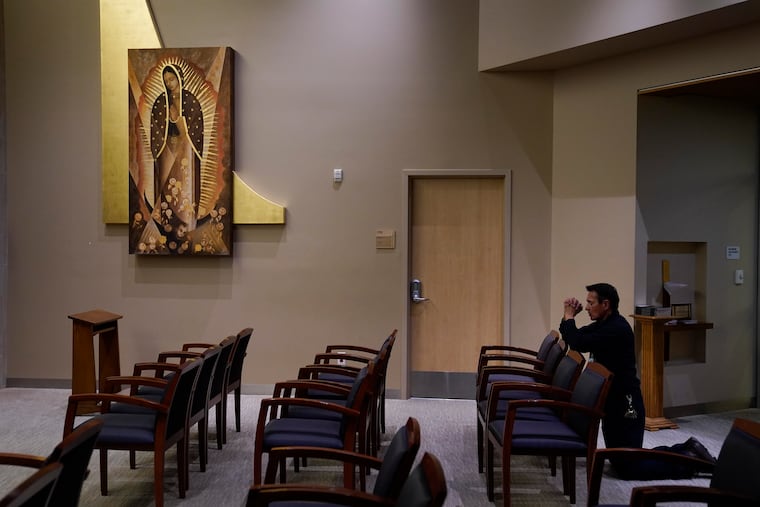As a hospital chaplain, I saw the profound grief of abortion up close
Abortion is not always incompatible with the Christian faith, writes Episcopalian priest Ryan Whitley.

When my telephone rang around 3 a.m. in 2010, I didn’t know it was a call that would change my thoughts on one of the most controversial topics on Earth.
On the other end of the line was a hospital operator who informed me there was a spiritual need in labor and delivery at Lankenau Hospital in Wynnewood, and I was the chaplain on call.
When I arrived, a nurse briefed me: A young woman who had learned that her baby had systemic malformations incompatible with life had to terminate her pregnancy or risk her own life. She was grieving this horrible, inconceivable loss — but was also experiencing crushing, overwhelming guilt because she believed she had committed a sin. The nurses were ill-equipped to handle such discussions, so they turned to the chaplain on call.
As it turns out, I was ill-equipped to deal with this matter, too. Prior to this, I hadn’t spent a lot of time thinking about abortion from a legal perspective, nor from a theological perspective. But I went in to speak with the patient anyway, breathing the Holy Spirit.
That night was when I started thinking more intentionally about the issue of abortion. I thought about it again this week, as news broke that the Supreme Court is likely poised to overturn Roe v. Wade, the landmark ruling that legalized the procedure.
» READ MORE: Who gets abortions in Pennsylvania, according to the data
Over the course of the next few years, I unofficially became the chaplain for Lankenau’s labor and delivery unit, returning dozens of times to counsel parents on the worst days of their lives. I never, ever felt fully prepared.
The women who underwent this procedure did so following much counseling and consideration. There was never a time when this was not surrounded by the most profound, often complicated grief I have ever witnessed.
I blessed new moms as they cradled their dead children. I baptized babies not long for this world, and even those who had just left it. I waited with premature children, their unbelievably tiny hands resting on my finger, until they breathed their last because the parent wanted somebody to be there with their baby but they couldn’t do it. I cried with nurses who had gone to work in what they expected to be the happiest place in the hospital — which it usually is, until it isn’t. I wept with families at the unexpected death of what they thought was a perfectly healthy baby, but who was born with the umbilical cord wrapped around the neck. I performed a funeral for twins, with a pair of sonogram images as the only pictures displayed on the altar. Years later, I attended the baptism of that family’s healthy daughter, whom they named Hope. I heard the confession of women who believed they had just committed murder. I prayed with Roman Catholic families whose own parish priests refused to see them. I sometimes went to do this work crossing through antiabortion protester picket lines.
I do not believe that abortion should ever be used as a method of birth control. But neither do I believe that it should never be an option for families facing unimaginable situations like the ones I witnessed during my time at Lankenau, or in cases of rape or other heinous crimes. These options must remain available and able to be performed in sterile environments by medical professionals.
In cases like what I have described above, I do not believe such options are incompatible with the Christian faith. In a series of statements over the past decades, the Episcopal Church has declared that “we emphatically oppose abortion as a means of birth control, family planning, sex selection, or any reason of mere convenience.” At the same time, since 1967, the Episcopal Church has maintained its “unequivocal opposition to any legislation on the part of the national or state governments which would abridge or deny the right of individuals to reach informed decisions [about the termination of pregnancy] and to act upon them.”
I pray that this draft Supreme Court opinion does not come to pass.
» READ MORE: I argued Planned Parenthood v. Casey in 1992. The Supreme Court’s Roe opinion is worse than I imagined.
This week, I’ve remembered the faces of all the women, I see their partners’ faces, and I see the faces of their tiny, beloved children. Many of those women would go on to bear healthy children, and had this option not been available to them, they may have died — either as a result of their unhealthy pregnancy, or an unsafe procedure performed in a nonsterile environment or by a nonmedical practitioner.
As our nation ponders this once again, I am reminded of those families to whom I ministered in their darkest nights.
The Rev. Ryan Whitley is the dean of the St. Petersburg Deanery and rector of St. Thomas’ Episcopal Church in St. Petersburg, Fla. He was the rector of St. George’s Episcopal Church in Ardmore from 2010 to 2017.